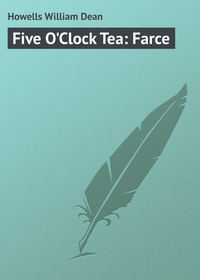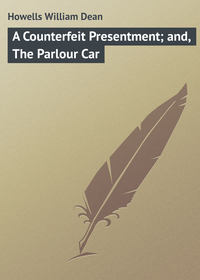
The Daughter of the Storage
"Only," she continued, "the men wouldn't come after the first go off. It was as bad as lunches. Now that the English way of serving tea to callers has come in, it's better. You really get the men, and it keeps them from taking cocktails so much."
"They're rather glad of that. But still, still, there's the guttling and guzzling."
"It's reduced to a minimum."
"But it's there. And the first thing you know you've loaded yourself up with cake or bread-and-butter and spoiled your appetite for dinner. No, afternoon tea must go with the rest of it, if we're going to be truly civilized. If people could come to one another's tables with full minds instead of stomachs, there would be some excuse for hospitality. Perhaps if we reversed the practice of the professional diner-out, and read up at home as he now eats at home, and – No, I don't see how it could be done. But we might take a leaf from the book of people who are not in society. They never ask anybody to meals if they can possibly help it; if some one happens in at meal-times they tell him to pull up a chair – if they have to, or he shows no signs first of going. But even among these people the instinct of hospitality – the feeding form of it – lurks somewhere. In our farm-boarding days – "
"Don't speak of them!" she implored.
"We once went to an evening party," he pursued, "where raw apples and cold water were served."
"I thought I should die of hunger. And when we got home to our own farmer's we ravaged the pantry for everything left from supper. It wasn't much. There!" Lindora screamed. "There is the taxi!" And the shuddering sound of the clock making time at their expense penetrated from the street. "Come!"
"How the instinct of economy lingers in us, too, long after the use of it is outgrown. It's as bad as the instinct of hospitality. We could easily afford to pay extra for the comfort of sitting here over these broken victuals – "
"I tell you we shall be left," she retorted; and in the thirty-five minutes they had at the station before their train started she outlined a scheme of social reform which she meant to put in force as soon as people began to gather in summer force at Lobster Cove.
He derided the notion; but she said, "You will see!" and in rather more time than it takes to tell it they were settled in their cottage, where, after some unavoidable changes of cook and laundress, they were soon in perfect running order.
By this time Lobster Cove was in the full tide of lunching and being lunched. The lunches were almost exclusively ladies' lunches, and the ladies came to them with appetites sharpened by the incomparable air of those real Lobster Cove days which were all cloudless skies and west winds, and by the vigorous automobile exercise of getting to one another's cottages. They seized every pretext for giving these feasts, marked each by some vivid touch of invention within the limits of the graceful convention which all felt bound not to transcend. It was some surprising flavor in the salad, or some touch of color appealing to the eye only; or it was some touch in the ice-cream, or some daring substitution of a native dish for it, as strawberry or peach shortcake; or some bold transposition in the order of the courses; or some capricious arrangement of the decoration, or the use of wild flowers, or even weeds (as meadow-rue or field-lilies), for the local florist's flowers, which set the ladies screaming at the moment and talking of it till the next lunch. This would follow perhaps the next day, or the next but one, according as a new cottager's claims insisted or a lady had a change of guests, or three days at the latest, for no reason.
In their rapid succession people scarcely noticed that Lindora had not given a lunch, and she had so far abandoned herself to the enjoyment of the others' lunches that she had half forgotten her high purposes of reform, when she was sharply recalled to them by a lunch which had not at all agreed with her; she had, in fact, had to have the doctor, and many people had asked one another whether they had heard how she was. Then she took her good resolution in both hands and gave an afternoon, asking people by note or 'phone simply whether they would not come in at four sharp. People were a good deal mystified, but for this very reason everybody came. Some of them came from somebody's lunch, which had been so nice that they lingered over it till four, and then walked, partly to fill in the time and partly to walk off the lunch, as there would be sure to be something at Lindora's later on.
It would be invidious to say what the nature of Lindora's entertainment was. It was certainly to the last degree original, and those who said the worst of it could say no worse than that it was queer. It quite filled the time till six o'clock, and may be perhaps best described as a negative rather than a positive triumph, though what Lindora had aimed at she had undoubtedly achieved. Whatever it was, whether original or queer, it was certainly novel.
A good many men had come, one at least to every five ladies, but as the time passed and a certain blankness began to gather over the spirits of all, they fell into different attitudes of the despair which the ladies did their best to pass off for rapture. At each unscheduled noise they started in a vain expectation, and when the end came, it came so without accent, so without anything but the clock to mark it as the close, that they could hardly get themselves together for going away. They did what was nice and right, of course, in thanking Lindora for her fascinating afternoon, but when they were well beyond hearing one said to another: "Well, I shall certainly have an appetite for my dinner to-night! Why, if there had only been a cup of the weakest kind of tea, or even of cold water!"
Then those who had come in autos gathered as many pedestrians into them as they would hold in leaving the house, or caught them up fainting by the way.
Lindora and Florindo watched them from their veranda.
"Well, my dear," he said, "it's been a wonderful afternoon; an immense stride forward in the cause of anti-eating – or – "
"Don't speak to me!" she cried.
"But it leaves one rather hungry, doesn't it?"
"Hungry!" she hurled back at him. "I could eat a – I don't know what!"
XV
CITY AND COUNTRY IN THE FALL
A Long-distance Eclogue1902 Morrison. Hello! Hello! Is that you, Wetherbee?Wetherbee. Yes. Who are you? What do you want with me?Morrison. Oh, nothing much. It's Morrison, you know;Morrison – down at Clamhurst Shortsands.Wetherbee. Oh!Why, Morrison, of course! Of course, I know!How are you, Morrison? And, by the way,Where are you? What! You never mean to sayYou are down there yet? Well, by the Holy Poker!What are you doing there, you ancient joker?Morrison. Sticking it out over Thanksgiving Day.I said I would. I tell you, it is gayDown here.You ought to see the Hunter's Moon,These silver nights, prinking in our lagoon.You ought to see our sunsets, glassy red,Shading to pink and violet overhead.You ought to see our mornings, still and clear,White silence, far as you can look and hear.You ought to see the leaves – our oaks and ashesCrimson and yellow, with those gorgeous splashes,Purple and orange, against the bluish greenOf the pine woods; and scattered in betweenThe scarlet of the maples; and the blazeOf blackberry-vines, along the dusty waysAnd on the old stone walls; the air just balm,And the crows cawing through the perfect calmOf afternoons all gold and turquoise. Say,You ought to have been with wife and me to-day,A drive we took – it would have made you sick:The pigeons and the partridges so thick;And on the hill just beyond Barkin's lane,Before you reach the barn of Widow Payne,Showing right up against the sky, as clearAnd motionless as sculpture, stood a deer!Say, does that jar you just a little? Say,How have you found things up there, anyway,Since you got back? Air like a cotton stringTo breathe? The same old dust on everything,And in your teeth, and in your eyes? The smokeFrom the soft coal, got long beyond a joke?The trolleys rather more upon your curves,And all the roar and clatter in your nerves?Don't you wish you had stayed here, too?Wetherbee. Well, yes,I do at certain times, I must confess.I swear it is enough at times to make you swearYou would almost rather be anywhereThan here. The building up and pulling down,The getting to and fro about the town,The turmoil underfoot and overhead,Certainly make you wish that you were dead,At first; and all the mean vulgarityOf city life, the filth and miseryYou see around you, make you want to putBack to the country anywhere, hot-foot.Yet – there are compensations.Morrison. Such as?Wetherbee. Why,There is the club.Morrison. The club I can't deny.Many o' the fellows back there?Wetherbee. Nearly all.Over the twilight cocktails there are tallStories and talk. But you would hardly care;You have the natives to talk with down there,And always find them meaty.Morrison. Well, so-so.Their words outlast their ideas at times, you know,And they have staying powers. The theatersAll open now?Wetherbee. Yes, all. And it occursTo me: there's one among the things that youWould have enjoyed; an opera with the new —Or at least the last – music by Sullivan,And words, though not Gilbertian, that ranTrippingly with it. Oh, I tell you what,I'd rather that you had been there than not.Morrison. Thanks ever so!Wetherbee. Oh, there is nothing meanAbout your early friend. That deer and autumn sceneWere kind of you! And, say, I think you likeAfternoon teas when good. I have chanced to strikeSome of the best of late, where people saidThey had sent you cards, but thought you must be dead.I told them I left you down there by the sea,And then they sort of looked askance at me,As if it were a joke, and bade me getMyself some bouillon or some chocolate,And turned the subject – did not even giveMe time to prove it is not life to liveIn town as long as you can keep from freezingBeside the autumn sea. A little sneezing,At Clamhurst Shortsands, since the frosts set in?Morrison. Well, not enough to make a true friend grin.Slight colds, mere nothings. With our open firesWe've all the warmth and cheer that heart desires.Next year we'll have a furnace in, and stayNot till Thanksgiving, but till Christmas Day.It's glorious in these roomy autumn nightsTo sit between the firelight and the lightsOf our big lamps, and read aloud by turnsAs long as kerosene or hickory burns.We hate to go to bed.Wetherbee. Of course you do!And hate to get up in the morning, too —To pull the coverlet from your frost-bit nose,And touch the glary matting with your toes!Are you beginning yet to break the iceIn your wash-pitchers? No? Well, that is nice.I always hate to do it – seems as ifSummer was going; but when your hand is stiffWith cold, it can be done. Still, I preferTo wash and dress beside my register,When summer gets a little on, like this.But some folks find the other thing pure bliss —Lusty young chaps, like you.Morrison. And some folks findA sizzling radiator to their mind.What else have you, there, you could recommendTo the attention of a country friend?Wetherbee. Well, you know how it is in Madison Square,Late afternoons, now, if the day's been fair —How all the western sidewalk ebbs and flowsWith pretty women in their pretty clo'es:I've never seen them prettier than this year.Of course, I know a dear is not a deer,But still, I think that if I had to meetOne or the other in the road, or street,All by myself, I am not sure but thatI'd choose the dear that wears the fetching hat.Morrison. Get out! What else?Wetherbee. Well, it is not so bad,If you are feeling a little down, or sad,To walk along Fifth Avenue to the Park,When the day thinks perhaps of getting dark,And meet that mighty flood of vehiclesLaden with all the different kinds of swells,Homing to dinner, in their carriages —Victorias, landaus, chariots, coupés —There's nothing like it to lift up the heartAnd make you realize yourself a part,Sure, of the greatest show on earth.Morrison. Oh, yes,I know. I've felt that rapture more or less.But I would rather put it off as longAs possible. I suppose you like the songOf the sweet car-gongs better than the cryOf jays and yellowhammers when the skyBegins to redden these October mornings,And the loons sound their melancholy warnings;Or honk of the wild-geese that write their AAlong the horizon in the evening's gray.Or when the squirrels look down on you and barkFrom the nut trees —Wetherbee. We have them in the ParkPlenty enough. But, say, you aged sinner,Have you been out much recently at dinner?Morrison. What do you mean? You know there's no one hereThat dines except ourselves now.Wetherbee. Well, that's queer!I thought the natives – But I recollect!It was not reasonable to expect —Morrison. What are you driving at?Wetherbee. Oh, nothing much.But I was thinking how you come in touchWith life at the first dinner in the fall,When you get back, first, as you can't at allLater along. But you, of course, won't careWith your idyllic pleasures.Morrison. Who was there?Wetherbee. Oh – ha, ha! What d'you mean by there?Morrison. Come off!Wetherbee. What! you remain to pray that came to scoff!Morrison. You know what I am after.Wetherbee. Yes, that dinner.Just a round dozen: Ferguson and BinnerFor the fine arts; Bowyer the novelist;Dr. Le Martin; the psychologistFletcher; the English actor Philipson;The two newspaper Witkins, Bob and John;A nice Bostonian, Bane the archæologer,And a queer Russian amateur astrologer;And Father Gray, the jolly ritualist priest,And last your humble servant, but not least.The food was not so filthy, and the wineWas not so poison. We made out to dineFrom eight till one A.M. One could endureThe dinner. But, oh say! The talk was poor!Your natives down at Clamhurst —Morrison. Look ye here!What date does Thanksgiving come on this year?Wetherbee. Why, I suppose – although I don't rememberCertainly – the usual 28th November.Morrison. Novem – You should have waited to get sober!It comes on the 11th of October!And that's to-morrow; and if you happen downLater, you'd better look for us in town.XVI
TABLE TALK
They were talking after dinner in that cozy moment when the conversation has ripened, just before the coffee, into mocking guesses and laughing suggestions. The thing they were talking of was something that would have held them apart if less happily timed and placed, but then and there it drew these together in what most of them felt a charming and flattering intimacy. Not all of them took part in the talk, and of those who did, none perhaps assumed to talk with authority or finality. At first they spoke of the subject as it, forbearing to name it, as if the name of it would convey an unpleasant shock, out of temper with the general feeling.
"I don't suppose," the host said, "that it's really so much commoner than it used to be. But the publicity is more invasive and explosive. That's perhaps because it has got higher up in the world and has spread more among the first circles. The time was when you seldom heard of it there, and now it is scarcely a scandal. I remember that when I went abroad, twenty or thirty years ago, and the English brought me to book about it, I could put them down by saying that I didn't know a single divorced person."
"And of course," a bachelor guest ventured, "a person of that sort must be single."
At first the others did not take the joke; then they laughed, but the women not so much as the men.
"And you couldn't say that now?" the lady on the right of the host inquired.
"Why, I don't know," he returned, thoughtfully, after a little interval. "I don't just call one to mind."
"Then," the bachelor said, "that classes you. If you moved in our best society you would certainly know some of the many smart people whose disunions alternate with the morning murders in the daily papers."
"Yes, the fact seems to rank me rather low; but I'm rather proud of the fact."
The hostess seemed not quite to like this arrogant humility. She said, over the length of the table (it was not very long), "I'm sure you know some very nice people who have not been."
"Well, yes, I do. But are they really smart people? They're of very good family, certainly."
"You mustn't brag," the bachelor said.
A husband on the right of the hostess wondered if there were really more of the thing than there used to be.
"Qualitatively, yes, I should say. Quantitatively, I'm not convinced," the host answered. "In a good many of the States it's been made difficult."
The husband on the right of the hostess was not convinced, he said, as to the qualitative increase. The parties to the suits were rich enough, and sometimes they were high enough placed and far enough derived. But there was nearly always a leak in them, a social leak somewhere, on one side or the other. They could not be said to be persons of quality in the highest sense.
"Why, persons of quality seldom can be," the bachelor contended.
The girl opposite, who had been invited to balance him in the scale of celibacy by the hostess in her study of her dinner-party, first smiled, and then alleged a very distinguished instance of divorce in which the parties were both of immaculate origin and unimpeachable fashion. "Nobody," she said, "can accuse them of a want of quality." She was good-looking, though no longer so young as she could have wished; she flung out her answer to the bachelor defiantly, but she addressed it to the host, and he said that was true; certainly it was a signal case; but wasn't it exceptional? The others mentioned like cases, though none quite so perfect, and then there was a lull till the husband on the left of the hostess noted a fact which renewed the life of the discussion.
"There was a good deal of agitation, six or eight years ago, about it. I don't know whether the agitation accomplished anything."
The host believed it had influenced legislation.
"For or against?" the bachelor inquired.
"Oh, against."
"But in other countries it's been coming in more and more. It seems to be as easy in England now as it used to be in Indiana. In France it's nothing scandalous, and in Norwegian society you meet so many disunited couples in a state of quadruplicate reunion that it is very embarrassing. It doesn't seem to bother the parties to the new relation themselves."
"It's very common in Germany, too," the husband on the right of the hostess said.
The husband on her left side said he did not know just how it was in Italy and Spain, and no one offered to disperse his ignorance.
In the silence which ensued the lady on the left of the host created a diversion in her favor by saying that she had heard they had a very good law in Switzerland.
Being asked to tell what it was, she could not remember, but her husband, on the right of the hostess, saved the credit of his family by supplying her defect. "Oh, yes. It's very curious. We heard of it when we were there. When people want to be put asunder, for any reason or other, they go before a magistrate and declare their wish. Then they go home, and at the end of a certain time – weeks or months – the magistrate summons them before him with a view to reconciliation. If they come, it is a good sign; if they don't come, or come and persist in their desire, then they are summoned after another interval, and are either reconciled or put asunder, as the case may be, or as they choose. It is not expensive, and I believe it isn't scandalous."
"It seems very sensible," the husband on the left of the hostess said, as if to keep the other husband in countenance. But for an interval no one else joined him, and the mature girl said to the man next her that it seemed rather cold-blooded. He was a man who had been entreated to come in, on the frank confession that he was asked as a stop-gap, the original guest having fallen by the way. Such men are apt to abuse their magnanimity, their condescension. They think that being there out of compassion, and in compliance with a hospitality that had not at first contemplated their presence, they can say anything; they are usually asked without but through their wives, who are asked to "lend" them, and who lend them with a grudge veiled in eager acquiescence; and the men think it will afterward advantage them with their wives, when they find they are enjoying themselves, if they will go home and report that they said something vexing or verging on the offensive to their hostess. This man now addressed himself to the lady at the head of the table.
"Why do we all talk as if we thought divorce was an unquestionable evil?"
The hostess looked with a frightened air to the right and left, and then down the table to her husband. But no one came to her rescue, and she asked feebly, as if foreboding trouble (for she knew she had taken a liberty with this man's wife), "Why, don't we?"
"About one in seven of us doesn't," the stop-gap said.
"Oh!" the girl beside him cried out, in a horror-stricken voice which seemed not to interpret her emotion truly. "Is it so bad as that?"
"Perhaps not quite, even if it is bad at all," he returned, and the hostess smiled gratefully at the girl for drawing his fire. But it appeared she had not, for he directed his further speech at the hostess again: really the most inoffensive person there, and the least able to contend with adverse opinions.
"No, I don't believe we do think it an unquestionable evil, unless we think marriage is so." Everybody sat up, as the stop-gap had intended, no doubt, and he "held them with his glittering eye," or as many as he could sweep with his glance. "I suppose that the greatest hypocrite at this table, where we are all so frankly hypocrites together, will not deny that marriage is the prime cause of divorce. In fact, divorce couldn't exist without it."
The women all looked bewilderedly at one another, and then appealingly at the men. None of these answered directly, but the bachelor softly intoned out of Gilbert and Sullivan – he was of that date:
"'A paradox, a paradox;
A most ingenious paradox!'"
"Yes," the stop-gap defiantly assented. "A paradox; and all aboriginal verities, all giant truths, are paradoxes."
"Giant truths is good," the bachelor noted, but the stop-gap did not mind him.
He turned to the host: "I suppose that if divorce is an evil, and we wish to extirpate it, we must strike at its root, at marriage?"
The host laughed. "I prefer not to take the floor. I'm sure we all want to hear what you have to say in support of your mammoth idea."
"Oh yes, indeed," the women chorused, but rather tremulously, as not knowing what might be coming.
"Which do you mean? That all truth is paradoxical, or that marriage is the mother of divorce?"
"Whichever you like."
"The last proposition is self-evident," the stop-gap said, supplying himself with a small bunch of the grapes which nobody ever takes at dinner; the hostess was going to have coffee for the women in the drawing-room, and to leave the men to theirs with their tobacco at the table. "And you must allow that if divorce is a good thing or a bad thing, it equally partakes of the nature of its parent. Or else there's nothing in heredity."
"Oh, come!" one of the husbands said.
"Very well!" the stop-gap submitted. "I yield the word to you." But as the other went no further, he continued. "The case is so clear that it needs no argument. Up to this time, in dealing with the evil of divorce, if it is an evil, we have simply been suppressing the symptoms; and your Swiss method – "
"Oh, it isn't mine," the man said who had stated it.
" – Is only a part of the general practice. It is another attempt to make divorce difficult, when it is marriage that ought to be made difficult."
"Some," the daring bachelor said, "think it ought to be made impossible." The girl across the table began to laugh hysterically, but caught herself up and tried to look as if she had not laughed at all.
"I don't go as far as that," the stop-gap resumed, "but as an inveterate enemy of divorce – "
An "Oh!" varying from surprise to derision chorused up; but he did not mind it; he went on as if uninterrupted.









